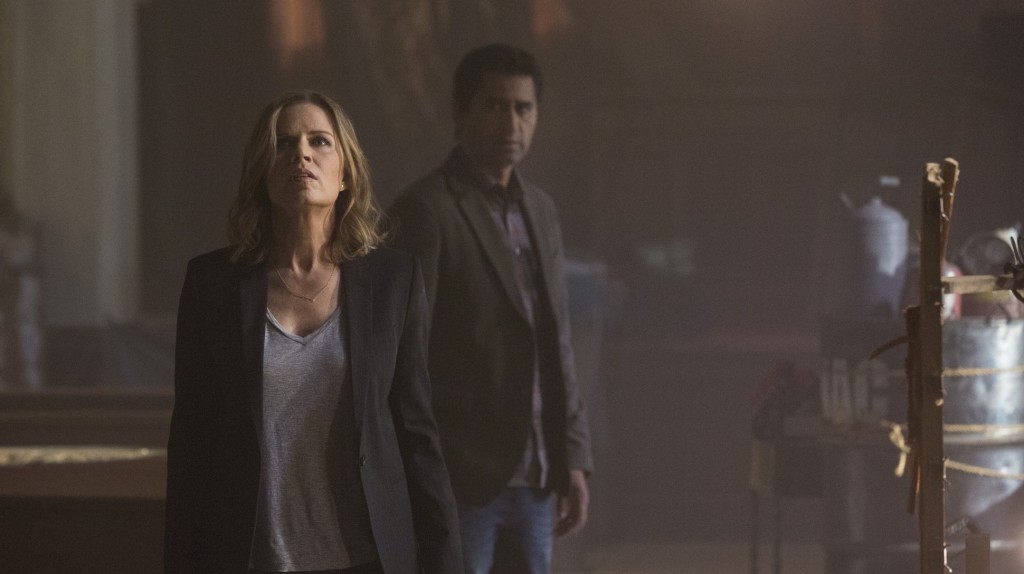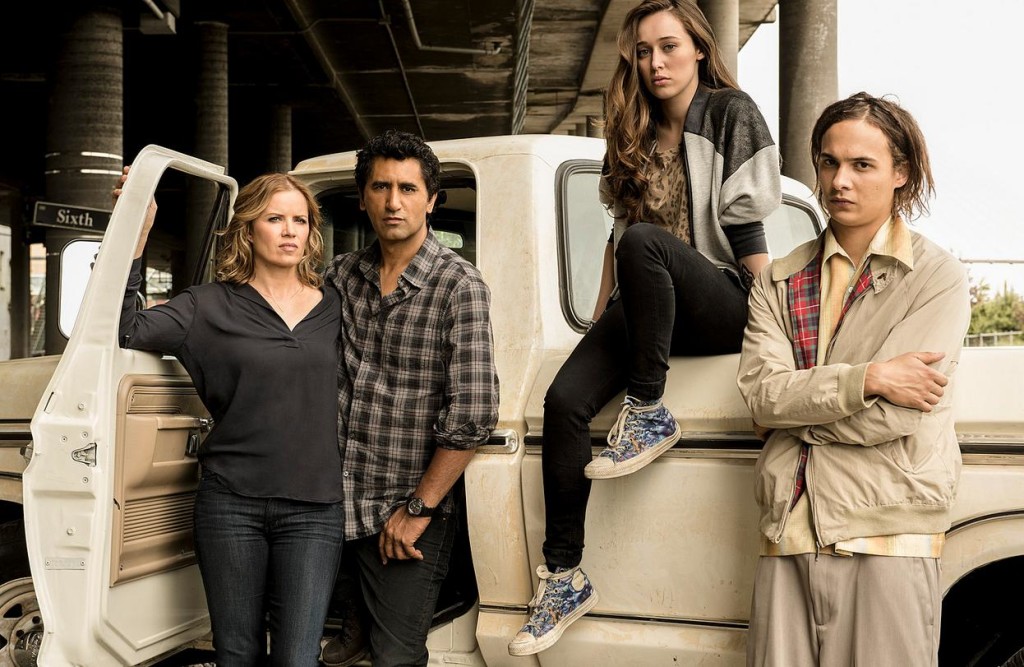Genre: TV Pilot – Horror/Zombie
Premise: An expansion of one of the most popular shows on television, The Walking Dead. Except in this piece, we begin our journey in Los Angeles, before the zombie virus has broken out.
About: Spin-off shows are nothing new. Hollywood’s been doing them forever. Heck, I think Steve Urkel once had one. But spinning off a genre show is new territory. Luckily, The Walking Dead is perfect for it. As we know, the zombie outbreak isn’t limited to suburban Atlanta. It’s infested the entire world. It makes sense, then, that we would explore other places to see how they’ve dealt with it. The pilot for the six-episode first season debuted last night on AMC to record ratings. Fans cannot get enough Walking Dead. To those who refuse to watch anything with zombies in it, let me say this. The “walking dead” in this show refers to the living here. “Dead” has always been about the characters and not the zombie battles. So if you haven’t given it a chance yet, try it. Maybe you’ll like it.
Creators and writers of first episode: Robert Kirkman, Dave Erickson (Erickson will be the showrunner for “Fear”)
Details: Pilot was 64 minutes. Script, as of September 2014, was 54 pages long.
I’ve been seeing a lot of criticism for “Fear The Walking Dead” online and, quite frankly, I’m surprised. Everybody’s saying that “nothing happens.” And, “It moves way too slow.” Uhhh, do Walking Dead fans know what universe they’re talking about? This show once had an entire season dedicated to people hanging out on a farm. This show was BUILT on slow. And it will always be that way.
I think that’s why they include so many characters. There’s so little going on plot-wise most of the time, that their only way to keep things fresh is cutting between different people.
But there’s a bit more going on in today’s pilot, and that’s that “Fear” is working with something very few shows ever get to work with – a general storyline that the audience already knows.
In TV pilots, they call it a “teaser.” An opening scene with a hook to make sure you’ll want to stay for the duration of the show. Imagine you had a pilot, then, where the audience had already experienced a five season teaser. That’s what “Fear” has.
We know where this is going. Zombies eating motherfuckers. And Kirkman, Gale Anne Hurd, and showrunner Dave Erickson, all know this. They know they have your interest, at the very least, until society starts breaking down.
So let me ask you this. Why would they give that to you right away? Let’s say in the very first scene of the show, society breaks down and our characters have to get in a car and drive for their lives. Would you be satisfied? I don’t think so.
Walking Dead thrives because it uses one of the oldest storytelling tricks in the book. It’s rarely the kill that gets us. It’s the anticipation of the kill.
So of course they’re going to draw this out. That’s part of the fun anyway, right? Anticipating the slow breakdown of society? Exploring how something like this could really happen? We rarely see that because “genre” has always been a movie format. And in movies, we don’t have time to get into the true minutiae of a society breaking down. But with TV, we’ve got all the time in the world. So why not take advantage of it?
What’s the pilot about? Well in our opening scene, a drug-addict named Nick Clark, who’s living in a drug den, watches in horror as his drug addict girlfriend eats the face off another man.
He runs the hell out of there and later ends up in the hospital. But of course no one believes his story, because he’s a drug addict. Nick’s mom, Madison, comes to her son’s side, bringing along public enemy number 1, Travis, her new boyfriend, someone Nick’s not keen on.
Nick also has a younger sister who’s fed up with her brother being in and out of drug houses, and this episode is really about this dysfunctional family trying to come to terms with their new arrangement.
Meanwhile, we get scattered news bites about how people around the world have been acting strange, violent even. Something is starting to happen, but everyone’s so consumed with their own individual lives, that nobody’s piecing together the bigger picture yet, a picture that’s about to get very ugly.
Okay, let’s remember something important here:
Features are about plot.
TV shows are about character.
It’s EXTREMELY important you remember this. Because when you write TV after coming from the feature world, one of the biggest mistakes you make is plotting things too quickly. It’s been drilled into your head that you need to MOVE THE STORY ALONG, so you’ll often cram 4-5 episodes of television into one.
Vince Gilligan, the creator of Breaking Bad, talks about this openly when discussing his show. His initial plan was to move the plot of Breaking Bad along A LOT quicker. He was even going to kill Jesse at the end of the first season!
It was the writer’s strike that actually allowed him to step back and realize how fast he was going, and to understand that if he was going to make this last for 5-6 seasons, he would need to slow the hell down.
So the next question becomes: If you can’t move the story along quickly, how do you entertain the audience? Especially since I’m always on here preaching URGENCY URGENCY URGENCY.
You do it through CONFLICT.
You create conflict between your characters and that conflict becomes the drama that drives the majority of the show’s entertainment. You may not be able to speed us towards that goal right away like you do in Raiders of the Lost Ark. But if you create unresolved dynamics between everyone, then whenever those characters are onscreen with one another, we’re going to be entertained. Because that conflict will play out in dramatic fashion.
Imagine if Walt and Jesse liked each other and got along swimmingly? The first three seasons of Breaking Bad would’ve been boring as hell, right? It was that conflict that drove a lot of the drama (with Breaking Bad, Gilligan also added a lot of urgency to his individual episodes, which is a discussion for another time – but that’s one of the reasons the show is considered a Top 5er. It did EVERYTHING right, not just some things).
So how does Fear the Walking Dead approach character conflict? Our main character (or one of them) is a drug addict. And that’s taking a huge toll on his mom (so we have deep-set conflict between mother and son).
Then, to add ANOTHER layer of conflict, we don’t have a normal father character. The dad’s out of the picture. We have mom’s new boyfriend playing “daddy,” which pushes Nick (our drug addict) away even more. He hates this guy (which equals more conflict!).
Finally we have a daughter who’s being ignored because her family is always consumed with Nick’s drug addiction. Her withdraw from them is another form of conflict that plays out in a subtle, but no less impactful, manner.
Now this doesn’t mean we abandon plot completely. Each episode should have some plot going on. And I actually prefer a great episode plot in addition to the character stuff. Then you have the best of all worlds (a story pushing us forward AND lots of unresolved character conflict).
But finding that balance between how much time you should spend on character conflict and how much time you should spend on plot is never easy. It’s something you’ll be working out in every single episode.
I think what happened here is that Kirkman and Erickson banked on the fact that you’d stick around through the first few episodes no matter what, so why not focus entirely on character and keep plot out of it? Some viewers didn’t like this approach, which is why “Fear” is getting backlash.
But the one place you can’t blow your story wad is in a pilot. You’ve got 75 more episodes to go. You need to move into things slowly. For that reason, I thought the pacing here was perfect and the only way they could’ve done it. Maybe there could’ve been a few more characters to jump around to. But I have a feeling when the shit hits the fan in Los Angeles, this show’s going to get stellar.
[ ] what the hell did I just watch?
[ ] wasn’t for me
[x] worth the watch
[ ] impressive
[ ] genius
What I learned: One of the first things you should do when writing a TV episode is write down all of the main relationships you’ll be exploring, and identify a key area of conflict in each relationship. It could be something obvious, like two characters who don’t like each other (Walter White and Jesse) or it could be something subtle (an under-the-surface lack of respect, as was the case with Shane and Rick in the original Walking Dead first season).
What I learned 2: Mix up the types of conflict in each individual relationship as much as possible. You want variation so that the interactions between the characters change in tone/style/approach every time you cut between scenes. For example, if Bob and Fred yell at each other all the time and you cut from them to Cass and John, who ALSO yell at each other all the time, your show feels repetitive. So create different types of conflict in each relationship. Maybe the conflict between John and Cass is that John is attracted to Cass but she’s not attracted to him. So whenever we cut to them, he’s trying to make a move on her, which is uncomfortable and creates – you guessed it – conflict. Conflict exists in hundreds of forms. Take advantage of that and mix it up!




